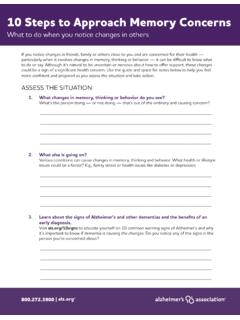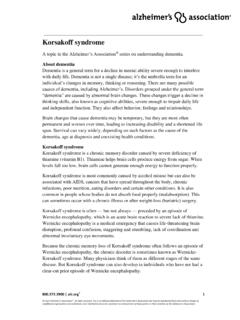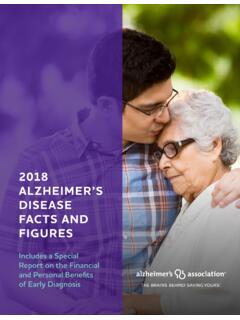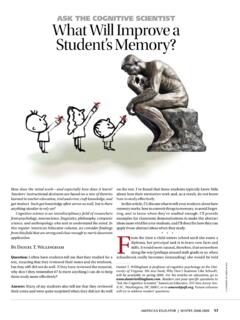Transcription of Diabetes and Cognitive Decline - Alzheimer's Association
1 Diabetes and Cognitive Decline There are more than 34 million Americans living with Diabetes . According to the American Diabetes Association , 25% of people age 65 and older in the United States have Diabetes (diagnosed and undiagnosed), and about half have prediabetes. Doctors don't yet understand exactly how Cognitive Decline and Diabetes are connected, but they do know that high blood sugar or insulin can harm the brain in several ways: Diabetes raises the risk of heart disease and stroke, which hurt the heart and blood vessels. Damaged blood vessels in the brain may contribute to Cognitive Decline . The brain depends on many different chemicals, which may be unbalanced by too much insulin. Some of these changes may help trigger Cognitive Decline . High blood sugar causes inflammation. This may damage brain cells and cause dementia to develop. Most people with Diabetes have Type 2, which is linked to lack of exercise and being overweight.
2 When Diabetes is not controlled, too much sugar remains in the blood. Over time, this can damage organs, including the brain. Scientists are finding more evidence that could link Type 2 Diabetes with Alzheimer's disease, the most common cause of dementia. Several research studies following large groups over many years suggest that adults with Type 2 Diabetes have a higher risk of developing Alzheimer's . What research has shown about the relationship between Diabetes and Cognitive Decline People with Type 1 Diabetes are at greater risk of dementia than people without Diabetes . According to the one study's results, Type 1 diabetics were 93% more likely to develop dementia. A 2021 study for Kaiser Permanente Northern California showed older adults with Type 1 Diabetes who were hospitalized for just one blood sugar extreme were at higher risk for dementia and those who were hospitalized for both highs and lows were six times more likely to later develop dementia.
3 There's a strong correlation between Alzheimer's disease and high blood sugar levels. One study found that people with high blood sugar levels such as those linked with Type 2 Diabetes had a dramatic increase in beta-amyloid protein, one of the hallmarks of Alzheimer's disease. | 1.. 2021 Alzheimer's Association . All rights reserved. This is an official publication of the Alzheimer's Association but may be distributed freely and without charge by unaffiliated organizations and individuals. Such distribution does not constitute an endorsement of these parties or their activities by the Alzheimer's Association . People in the early stages of Type 2 Diabetes have signs of brain dysfunction. In fact, one study's participants showed high levels of insulin resistance in the brain and a reduced ability to use glucose to fuel normal brain function. Individuals with Type 2 Diabetes show accelerated Cognitive Decline , specifically in executive function and information-processing speed.
4 Another study found that those whose onset of Type 2 Diabetes was at a younger age are at higher risk of dementia. The early effects of Diabetes on the brain were related to levels of a blood protein called hemoglobin A1C (HbA1C). Researchers found that even people who had Diabetes for less than 10 years had deficits in memory function typically associated with a brain region called the hippocampus. They found that people with Diabetes had smaller hippocampal sizes than people without Diabetes . They also discovered that the decreases in hippocampal size were correlated to HbA1C. blood levels, suggesting that HbA1C could be used to indicate hippocampal function and/or the onset of memory loss. The amyloid precursor protein gene, known to be involved in some cases of Alzheimer's , affects the insulin pathway. Disruption of this pathway is a hallmark of Diabetes . The research could point to a therapeutic target for both diseases.
5 Reducing risk for Diabetes The American Heart Association has identified lifestyle changes to achieve better cardiovascular health and reduce the risk for Diabetes and dementia. The Life's Simple 7 include: 1. Manage blood pressure 2. Control cholesterol 3. Reduce blood sugar 4. Get active be physically active every day 5. Eat better enjoy a healthy, low-fat diet 6. Lose weight 7. Stop smoking Additional Resources My Life Check/Life's Simple 7. | 2.. 2021 Alzheimer's Association . All rights reserved. This is an official publication of the Alzheimer's Association but may be distributed freely and without charge by unaffiliated organizations and individuals. Such distribution does not constitute an endorsement of these parties or their activities by the Alzheimer's Association . TS-0037 | Updated November 2021. | 3.. 2021 Alzheimer's Association . All rights reserved. This is an official publication of the Alzheimer's Association but may be distributed freely and without charge by unaffiliated organizations and individuals.
6 Such distribution does not constitute an endorsement of these parties or their activities by the Alzheimer's Association .
















